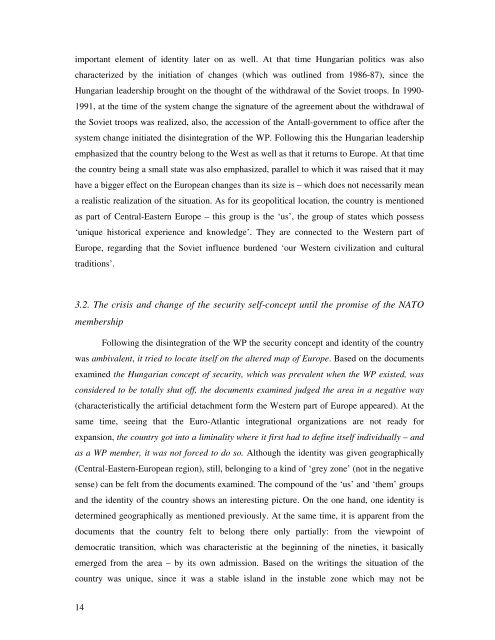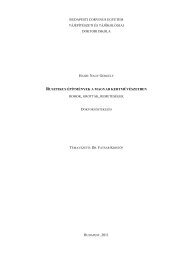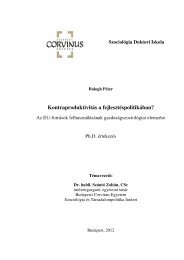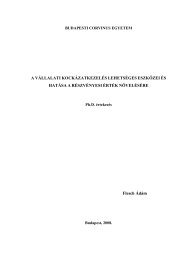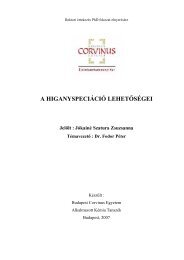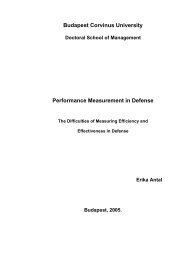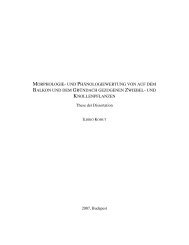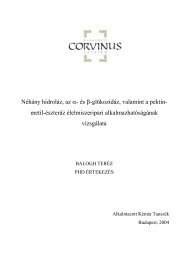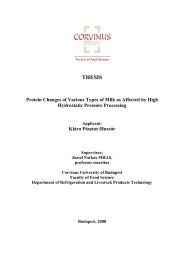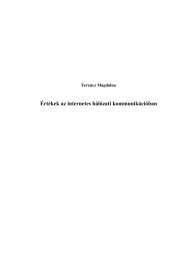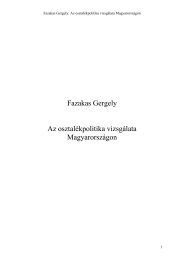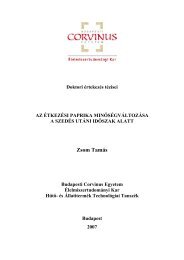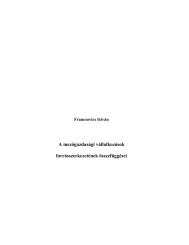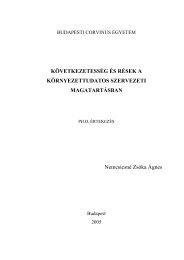THESES Kőváriné Ignáth Éva
THESES Kőváriné Ignáth Éva
THESES Kőváriné Ignáth Éva
Create successful ePaper yourself
Turn your PDF publications into a flip-book with our unique Google optimized e-Paper software.
important element of identity later on as well. At that time Hungarian politics was also<br />
characterized by the initiation of changes (which was outlined from 1986-87), since the<br />
Hungarian leadership brought on the thought of the withdrawal of the Soviet troops. In 1990-<br />
1991, at the time of the system change the signature of the agreement about the withdrawal of<br />
the Soviet troops was realized, also, the accession of the Antall-government to office after the<br />
system change initiated the disintegration of the WP. Following this the Hungarian leadership<br />
emphasized that the country belong to the West as well as that it returns to Europe. At that time<br />
the country being a small state was also emphasized, parallel to which it was raised that it may<br />
have a bigger effect on the European changes than its size is – which does not necessarily mean<br />
a realistic realization of the situation. As for its geopolitical location, the country is mentioned<br />
as part of Central-Eastern Europe – this group is the ‘us’, the group of states which possess<br />
‘unique historical experience and knowledge’. They are connected to the Western part of<br />
Europe, regarding that the Soviet influence burdened ‘our Western civilization and cultural<br />
traditions’.<br />
3.2. The crisis and change of the security self-concept until the promise of the NATO<br />
membership<br />
14<br />
Following the disintegration of the WP the security concept and identity of the country<br />
was ambivalent, it tried to locate itself on the altered map of Europe. Based on the documents<br />
examined the Hungarian concept of security, which was prevalent when the WP existed, was<br />
considered to be totally shut off, the documents examined judged the area in a negative way<br />
(characteristically the artificial detachment form the Western part of Europe appeared). At the<br />
same time, seeing that the Euro-Atlantic integrational organizations are not ready for<br />
expansion, the country got into a liminality where it first had to define itself individually – and<br />
as a WP member, it was not forced to do so. Although the identity was given geographically<br />
(Central-Eastern-European region), still, belonging to a kind of ‘grey zone’ (not in the negative<br />
sense) can be felt from the documents examined. The compound of the ‘us’ and ‘them’ groups<br />
and the identity of the country shows an interesting picture. On the one hand, one identity is<br />
determined geographically as mentioned previously. At the same time, it is apparent from the<br />
documents that the country felt to belong there only partially: from the viewpoint of<br />
democratic transition, which was characteristic at the beginning of the nineties, it basically<br />
emerged from the area – by its own admission. Based on the writings the situation of the<br />
country was unique, since it was a stable island in the instable zone which may not be


